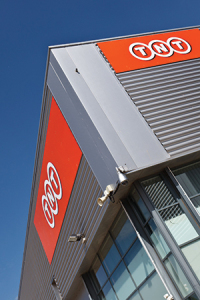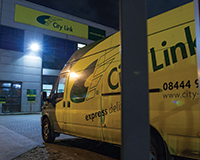 A massive shake-out among the parcels carriers is about to begin. The pre-Christmas crash-and-burn of parcels business City Link heralds years of consolidation in the parcels sector as operators confront high costs and low margins, say analysts.
A massive shake-out among the parcels carriers is about to begin. The pre-Christmas crash-and-burn of parcels business City Link heralds years of consolidation in the parcels sector as operators confront high costs and low margins, say analysts.
City Link’s administrators, EY, says it has so far “completed the surrender of three leasehold properties, and is negotiating the assignment and surrender of other properties. The City Link estate had a total of 1.9m sq ft on appointment of the administrators.”
City Link, which went into administration in December 2014, always seemed likely to be the first to go. The business, formed from a 2007 merger with Target Express, had not turned a profit in five years. However, market-watchers say defensive consolidation among the small- and medium-sized parcels businesses is unavoidable. The half-dozen big players who remain could also see predatory mergers.
For the property business – buoyed by the expansion of the parcels carriers during the dark days of 2009-2013 – it is going to mean some rethinking.
City Link was already restructuring its property portfolio before the parcels business’s pre-Christmas crash. DTZ had already been instructed to dispose of their 15,732 sq ft warehouse at Acre Road, Reading. But a big shake-out in the parcels sector could mean the rationalisation of a parcels sector portfolio that runs to millions of square feet (CBRE and BNP Paribas Real Estate are both looking into the numbers).
A spate of mergers and acquisitions among parcels operators – and perhaps a few more City Link-style collapses – come as a result of a troubled business model, say observers. If fixed costs are growing faster than income then disaster – or selling out – is the only option.
Christopher Bamberry is sector analyst at stockbrokers Peel Hunt. He says: “In some ways City Link was unusual – it was heavily loss-making for years and proved itself incapable of making profits in the key fourth quarter, around Christmas. Of course it is not the only operator to fail to cope with the spike in demand – and in an intensely competitive market its removal reduces capacity and will help its former rivals.
“Yes, property was part of the problem – long leases, depots in the wrong places, a network with excess capacity in the South East, some premises that were not suitable, and that added extra cost in a business which is all about margins. But City Link is not alone, because the industry as a whole has struggled to make decent profits. Those that are succeeding, like DX and Royal Mail, are larger – economies of scale matter.”
Bamberry predicts a wave of medium-term consolidation among smaller and mid-sized parcels operators. “A smaller number of bigger carriers – that’s where we’re headed. The six or eight firms that dominated today will eat the smaller firms first, then we’ll see gradual consolidation in the bigger firms in the medium-term,” he says.
The extent of overcapacity in the parcels sector isn’t clear – but it is clear that more realistic pricing for online delivery is part of the solution. Without it, neither retailers nor their third-party carriers can turn an honest profit.
Knight Frank retail partner Alex Munro has been monitoring the economics of the online grocery businesses and says there are lessons for anyone whose business model is driven by low-cost delivery of online orders.
Last year he calculated that online grocery was losing the supermarkets as much as £10 for each delivery, thanks to merely nominal charges to customers.
“The figures haven’t changed much. The viability of online grocery is still in question. In a low-margin business confronted with deflation, unless you charge customers economically you’re losing more money. We’re going to see retailers recognise that the online model works well for some products, and not for others. Multi-channel retail is here to stay, but retailers will have to ask if they can continue to let store shoppers subsidise online shoppers,” says Munro.
Pressure from retail customers will combine with pressure generated by an over-capacity parcels sector to cause fundamental change, and the property market must be prepared for the shock, hints GVA director Chris Kershaw.
“The parcels business already has some property legacy issues – properties inherited from businesses that operators took over or merged with – often older 1990s buildings on unserved sites, with not enough loading doors and small yards. That isn’t ideal,” he says. He implies that in the industry shake-down, properties like this will be the first to go.
“The parcels boys are different from others in the supply chain in that they need specialised hub sorting centres and many smaller spoke depots – and the big hubs like TNT’s 56,000 hub at IDI Gazeley’s G Park Swindon or DPD’s 330,000 sq ft parcel hub, close to J1 of the M69 at Hinkley – are costly, not least because they eat land,” he adds. Improved sorting centres could help create a more cost-effective and profitable parcels sector – but such monster investments will be few and far between.
Today Kershaw says parcels businesses are still net additional users of industrial floorspace. But for how much longer? In the wake of the City Link collapse, the day when parcels take-up goes into reverse can’t be far away.
 How other companies are working: TNT
How other companies are working: TNT
TNT’s new 56,000 sq ft parcel hub at G Park Swindon could be a model for other carriers struggling with the troubled financial dynamics of the parcels sector.
The development – which follows a deal with IDI Gazeley – will serve as a specialist regional parcel distribution hub for TNT’s expanding delivery business serving deliveries throughout Swindon and the South West. The building will feature 47,717 sq ft of distribution space with the capacity to accommodate 62 delivery vehicles. There will also be a security gatehouse, a 50-metre truck court depth, 101 loading doors and a 32-metre building depth.
Simon Harper, director of operations at TNT UK, says: “Coupled with TNT’s £35m investment in its fleet of vehicles, the new Swindon sortation centre will enable us to keep parcels destined for customers in the South West within the region, thereby cutting delivery times. Relieving some of the burden on our depots serving areas around Exeter, Bodmin, Bristol, Reading, Slough, Southampton and Byfleet, will enable TNT to increase our speed and efficiency. This will benefit local business and others around the UK because it enables us to efficiently pre-sort shipments going to our main sorting hubs at Kingsbury and Atherstone in the Midlands.”
Harper says:“Earlier sort times throughout the network mean earlier deliveries to our customers.”
The 98-acre G Park Swindon is close to junction 15 of the M4 motorway.
Lost in the post?
Royal Mail has been the big winners as the parcels carriers scrap for business – but even they took a big profits hit in the run-up to Christmas.
In January the part-privatised business reported UK parcel volumes were up 4% year-on-year in December, taking the total to 120m – slightly under half the month’s UK parcels hoard. Even so, Royal Mail said UK parcel revenues were flat over the nine months to Christmas, thanks to downward pressure on income. They blamed over-capacity in the parcels sector.
However, profits were down by 21% at £279m. Royal Mail could suffer further as Amazon – until now one of its biggest customers – develops its own parcels delivery business. Some analysts suggest this kind of vertical integration could rescue the parcels carriers. Others – pointing to the example of the supermarkets – doubt it will resolve the problem for long.
 City Link winds down
City Link winds down
Adminsitrators at EY closed 51 UK depots in January.
The administrators sold plant and machinery worth £1.13m to rival logistics company DX Group.
More than 2,300 City Link staff were made redundant on new year’s eve after last-minute talks between EY and a mystery buyer collapsed











